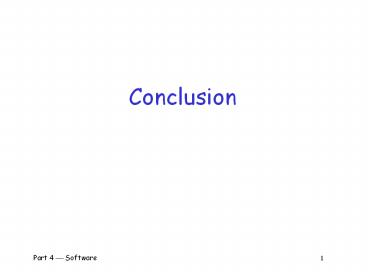Conclusion PowerPoint PPT Presentation
Title: Conclusion
1
Conclusion
2
Course Summary
- Crypto
- Basics, symmetric key, public key, hash functions
and other topics, cryptanalysis - Access Control
- Authentication, authorization
- Protocols
- Simple authentication
- Real-World SSL, IPSec, Kerberos, GSM
- Software
- Flaws, malware, SRE, development, OS issues
3
Crypto Basics
- Terminology
- Classic cipher
- Simple substitution
- Double transposition
- Codebook
- One-time pad
- Basic cryptanalysis
4
Symmetric Key
- Stream ciphers
- A5/1
- RC4
- Block ciphers
- DES
- AES, TEA, etc.
- Modes of operation
- Data integrity (MAC)
5
Public Key
- Knapsack (insecure)
- RSA
- Diffie-Hellman
- Elliptic curve crypto (ECC)
- Digital signatures and non-repudiation
- PKI
6
Hashing and Other
- Birthday problem
- Tiger Hash
- HMAC
- Clever uses online bids, spam reduction
- Other topics
- Secret sharing
- Random numbers
- Information hiding (stego, watermarking)
7
Advanced Cryptanalysis
- Linear and differential cryptanalysis
- RSA side channel attack
- Knapsack attack (lattice reduction)
- Hellmans TMTO attack on DES
8
Authentication
- Passwords
- Verification and storage (salt, etc.)
- Cracking (math)
- Biometrics
- Fingerprint, hand geometry, iris scan, etc.
- Error rates
- Two-factor, single sign on, Web cookies
9
Authorization
- ACLs and capabilities
- MLS ? BLP, Biba, compartments, covert channel,
inference control - CAPTCHA
- Firewalls
- IDS
10
Simple Protocols
- Authentication
- Using symmetric key
- Using public key
- Establish session key
- PFS
- Timestamps
- Authentication and TCP
- Zero knowledge proof (Fiat-Shamir)
11
Real-World Protocols
- SSL
- IPSec
- IKE
- ESP/AH
- Kerberos
- GSM
- Security flaws
12
Software Flaws and Malware
- Flaws
- Buffer overflow
- Incomplete mediation, race condition, etc.
- Malware
- Brain, Morris Worm,Code Red, Slammer
- Malware detection
- Future of malware
- Other software-based attacks
- Salami, linearization, etc.
13
Insecurity in Software
- Software reverse engineering (SRE)
- Software protection
- Digital rights management (DRM)
- Software development
- Open vs closed source
- Finding flaws (math)
14
Operating Systems
- OS security functions
- Separation
- Memory protection, access control
- Trusted OS
- MAC, DAC, trusted path, TCB, etc.
- NGSCB
- Technical issues
- Criticisms
15
Crystal Ball
- Cryptography
- Well-established field
- Dont expect major changes
- But some systems will be broken
- ECC is a growth area
- Quantum crypto may prove worthwhile (so far, lots
of hype, little thats useful)
16
Crystal Ball
- Authentication
- Passwords will continue to be a problem
- Biometrics should become more viable
- Smartcard will be used more
- Authorization
- ACLs, etc., well-established areas
- CAPTCHAs interesting new topic
- IDS is a very hot topic
17
Crystal Ball
- Protocols are challenging
- Very difficult to get protocols right
- Protocol development often haphazard
- Kerckhoffs Principle for protocols?
- How much would it help?
- Protocols will continue to be a significant
source of security failure
18
Crystal Ball
- Software is a huge security problem today
- Buffer overflows should decrease
- Race condition attacks might increase
- Virus writers are getting smarter
- Polymorphic, metamorphic, whats next?
- Not easy to detect
- Malware will continue to plague us
19
Crystal Ball
- Other software issues
- Reverse engineering will remain
- Secure development inherently hard
- Open source not a panacea
- OS issues
- NGSCB will change things
- But for better or for worse?
20
The Bottom Line
- Security knowledge is needed today
- and it will be needed in the future
- Necessary to understand technical issues
- The focus of this class
- But technical knowledge is not enough
- Human nature, legal issues, business issues, etc.
- Experience also important

